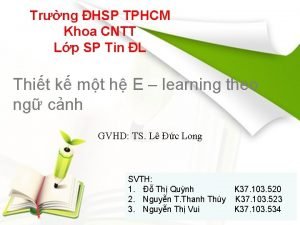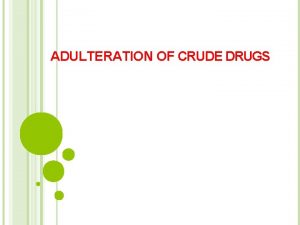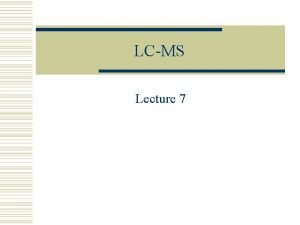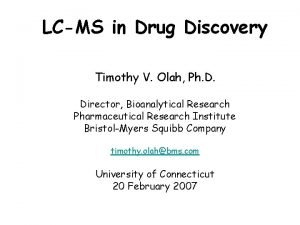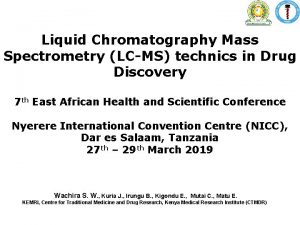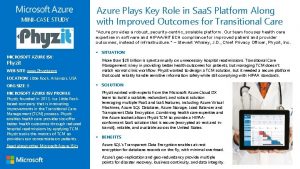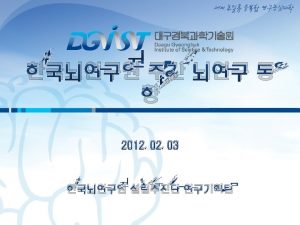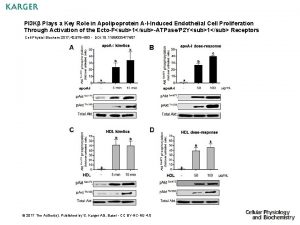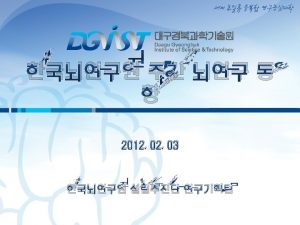LCMS plays a key role in the drug



























- Slides: 27
























LC/MS plays a key role in the drug discovery and drug development process. Since the introduction of electrospray ionization a variety of LC/MS applications for the pharmaceutical industry have been developed for compound identification and quantification. LC/MS is suitable for many applications, from pharmaceutical development to environmental analysis. Its ability to detect a wide range of compounds with great sensitivity and speci- ficity has made it popular in a variety of fields. LCMS is always the method of choice when liquid chromatography is an essential step in an analytical procedure anyway, namely for the determination of highly polar, chemically or thermally labile compounds.

Biomedical Applications The LC-MS technique is useful for the detection of steroid drugs in body fluids and in profiling endogenous steroids. Steroid sulfates have been detected with high sensitivity using this method. Plasmaspray has been used to test saliva for steroid hormones in patients suffering from congenital adrenal hyperplasia. Amino acids were one of the first compounds analyzed using LC-MS coupled with laser desorption and thermospray. Nucleosides, nucleotides, saccharides, peptides, and proteins were all analyzed and their molecular weights were determined using LC-MS coupled with electrospray. Bile acids have also been determined using LC-MS and thermospray. Environmental Applications LC-MS is used in the analysis of diverse samples such as soil, drinking water or waste water, air, and sludge. The samples may belong to many different chemical species ranging from non-polar hydrocarbons to ionic organometallic species. Several pesticides and herbicides including triazine derivatives, chlorophenols, phenoxyalkanoic acids, and sulfonylurea herbicides can be analyzed using LC-MS. Separation of polycyclic aromatic hydrocarbons and organometallic compounds is also possible using the technique.

Biochemical Screening for Genetic Disorders Blood samples of newborn babies are analyzed using LC-MS to detect metabolic disorders. Pharmaceuticals LC-MS is widely used in the determination of pharmaceutical compounds and especially in the separation of optically active drugs. Antibiotics and potential antimalarials have been studied using thermospray. The use of LC-MS in the identification of bromazepam and similar drugs in case of intoxication has been successfully demonstrated. Therapeutic Drug Monitoring and Toxicology In drug monitoring, LC-MS assays have been developed for immunosuppressants including tacrolimus, cyclosporin, everolimus, sirolimus, and mycophenolic acid. Similar assays for aminoglycosides, anticancer drugs, and antiretrovirals have also been described.

Steroid Hormones LC-MS analysis has been helpful in steroid biochemistry studies where traditional immunoassays have not proved very effective. Highly sensitive LC-MS assays have been developed for the measurement of low dihydrotestosterone and testosterone levels in women and children. Vitamins and Related Metabolites LC-MS is a preferred method for the measurement of vitamin D and its metabolites. LC-MS assays have been developed for 25 -hydroxyvitamin D 2 and D 3 in plasma and serum. Similar assays are also available for fat-soluble vitamins such as vitamin K 15 and Vitamin E 13, 15.
 Miracle and morality plays definition
Miracle and morality plays definition Lcms là gì
Lcms là gì Outstart lcms
Outstart lcms Plays an important role in molding the personality
Plays an important role in molding the personality How to win a deca role play
How to win a deca role play Deca role play rubric
Deca role play rubric Communication plays a very important role in
Communication plays a very important role in Forecasting plays an important role in
Forecasting plays an important role in Dignity: the essential role it plays in resolving conflict
Dignity: the essential role it plays in resolving conflict Learning activity examples
Learning activity examples Describe the role competition plays in shaping communities.
Describe the role competition plays in shaping communities. Nonverbal communication plays an important role in
Nonverbal communication plays an important role in An example of crude drug adulterated with exhausted drug
An example of crude drug adulterated with exhausted drug Web role in azure
Web role in azure Role making krappmann
Role making krappmann Statuses and their related roles determine the structure
Statuses and their related roles determine the structure Key partners adalah
Key partners adalah Key partners key activities key resources
Key partners key activities key resources Hình ảnh bộ gõ cơ thể búng tay
Hình ảnh bộ gõ cơ thể búng tay Slidetodoc
Slidetodoc Bổ thể
Bổ thể Tỉ lệ cơ thể trẻ em
Tỉ lệ cơ thể trẻ em Voi kéo gỗ như thế nào
Voi kéo gỗ như thế nào Tư thế worms-breton
Tư thế worms-breton Bài hát chúa yêu trần thế alleluia
Bài hát chúa yêu trần thế alleluia Các môn thể thao bắt đầu bằng tiếng đua
Các môn thể thao bắt đầu bằng tiếng đua Thế nào là hệ số cao nhất
Thế nào là hệ số cao nhất Các châu lục và đại dương trên thế giới
Các châu lục và đại dương trên thế giới

